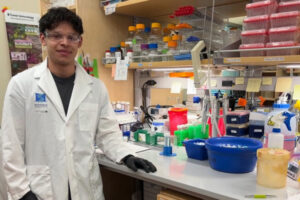Henry S. White - A Positive Force in Electrochemistry

Henry S. White
From energy storage and generation to nanoscale 3D battery architectures to the transport of drugs through human skin, Henry White’s research is pioneering and highly imaginative within the field of electrochemistry. His work on nanoscale electrochemistry was groundbreaking and has developed into a significant field of research with various applications. Professor of Chemistry Shelley Minteer commented that White “greatly enjoys complex problems and is the electrochemist to go to when you have complex mass transport phenomena to understand.”
There’s an obvious reason why Henry White is considered one of the most influential and innovative electrochemists of his generation: he wears his passion and thoroughness for research on his sleeve. White maintained a strong research group funded by the National Institutes of Health, National Science Foundation, the Department of Energy, and the Department of Defense while serving for six years as Chair of the Department of Chemistry, then five years as Dean of the College of Science. His administrative service was a commitment back to an institution that allows him to do what he loves most: teaching and research.

Henry S. White
Now that he can once again devote all of his time to research and teaching, White is thrilled to be immersed in the frontiers of electrochemistry—asking relevant and innovative questions for our generation’s complex problems. As the Widtsoe Presidential Chair, he continues to train postdoctoral fellows, undergraduates, and graduate students in electrochemistry. The Widtsoe Chair specifically is valuable in providing funding for students to do high risk and truly innovative research that they wouldn’t otherwise be able to do.
“There are a lot of great questions” in the field of electrochemistry says White. Research isn’t just about solving a problem, it’s about learning how to ask interesting and original questions—something White finds a lot of joy in doing.
“Electrochemistry is a fascinating area of science, and a very diverse area, comprising many fundamental research topics in chemistry, materials science, physics, and engineering. It is also extremely relevant in providing potential solutions to many problems that society faces, especially in providing means for developing sustainable energy sources. I’ve been very fortunate during my career to have had the necessary funding and resources to work on very basic science questions in this area. And I’ve been even more fortunate to be able to work with incredibly talented students and postdocs at the University of Utah, many who have continued to work on electrochemical problems in both industry and academics.”
Dr. Hang Ren, a former postdoc of White’s who is now an Assistant Professor at Miami University in Ohio, focused on electrical measurements on individual DNA molecules trapped inside a protein nanopore while training with White. They were able to trap a single DNA molecule for hours, and watch its motional dynamics, and monitor chemical reactions via the change in electrical current through the protein.
In a second research project, they used platinum electrodes with radii as small as 5 nanometers to measure the nucleation rates of bubbles. They were able to generate a single nanobubble at the electrode surface, measure the nucleation rate, and infer the geometry of the smallest stable bubble that contained as few as 25 molecules. “This is a fundamentally important problem in the field of electrocatalysis, where bubbles are often formed and disrupt the catalytic processes on the electrode,” says Professor Ren.

Dr. Rui Gao, Dr Henry S. White, & Dr Koushik Barman.
White trains his students and postdocs on how to be a researcher, to ask innovative questions, and to be relentlessly rigorous in their approach. As he works with undergraduate and graduate students as well as postdocs, his methods are significantly influencing the next generation of scientists to continue a legacy of research excellence. After training with White for years, Professor Ren affirms that “Henry’s research approach is very unique. In addition to solving scientific problems elegantly, he is especially great at asking fundamental scientific questions. He is also highly innovative and very good at exploring new directions in electrochemistry. I was greatly influenced by my postdoc training with him.”
Henry White’s research is often cited by other researchers and is foundational in the fields of electrochemistry and analytical chemistry. “Henry has an uncommon disposition for innovation in undertaking both experimental and theoretical challenges in his research,” says Joel Harris, Distinguished Professor of Chemistry. White’s research has been recognized in major awards from the Society of Electroanalytical Chemistry, the Royal Society of Chemistry, the ACS Division of Analytical Chemistry, and the Electrochemical Society. He is also a Fellow of the American Academy of Arts and Sciences, the American Chemical Society, and the American Association for the Advancement of Science.
- by Anne Marie Vivienne
First Published in Discover Magazine, Fall 2019




